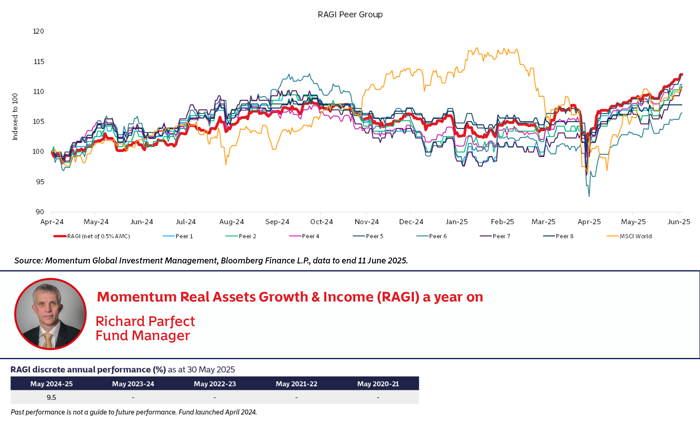
What this chart shows
Having been running for over a year we thought it was worth taking stock of progress of the Fund we launched in April 2024 to capitalise on the attractive opportunities in the listed investment trust space focussed on real assets as opposed listed equities.
The fund was designed to take advantage of the varied opportunities within the listed investment trust space to gain access to the types of investment that are not otherwise attainable through a normal UCITS open ended fund structure. We took the decision to include a broader range of assets: property, infrastructure, private equity, specialist debt and leasing along with a defensive liquidity sleeve of gold, government debt and uncorrelated fund strategies to provide a degree of cushioning from the share price volatility that can exist.
The chart shows RAGI achieving a return of 12.9% since inception which is ahead of its targeted annual return of 7% through the cycle. Furthermore, it has outperformed a set of peer funds and with less volatility. Stock selection and the defensive assets have both played a part here, for example the fund started with an overweight position in gold in 2024, which was then reduced into the metal’s strength to fund reinvestment into other under-valued assets.
In addition, it is also notable that, although not necessarily designed to do so, RAGI’s returns are ahead of global equities, as the dominant strength of US equities is now being called into question.
Why this is important
As we have written several times during the last 2 or 3 years, this much-loved corner of the market has had more than its fair share of problems that resulted in a complete dislocation of share prices from realistic value. Those problems are slowly being worked through and in some cases reversed.
One important catalyst for change has been the emergence of corporate activity or “M&A”. Trusts have received bids at around net asset value (NAV) and in some cases, at a premium to NAV. Since April 2024 RAGI has directly benefitted from this with bids in its holdings of: Hipgnosis Songs Fund, BBGI Global Infrastructure and Assura. In addition, other holdings such as PRS REIT are in the process of undertaking a sale of the underlying portfolio of assets with a view to return that capital to shareholders at a value that is a significant premium to where the shares had previously traded.
We appear to be in the foothills of the recovery for this sector and Boards are under increasing pressure to address the unsustainable discounts their companies are on. Not only are shareholders such as us applying pressure, there is also increased interest from overseas investors. North American investors are particularly attuned as the UK is often the first port of call for those seeking to divert funds away from the US.
Finding more information
Rising geopolitical tensions—particularly the escalating Israel-Iran conflict—have significantly unsettled global markets, driving energy prices sharply higher and prompting a flight to safe assets.

-
Israel and Iran launched fresh attacks on each other, killing scores of civilians and raising fears of a wider conflict, US President Donald Trump said it could be ended easily while warning Tehran not to strike any US targets.
-
The Fed is likely to maintain interest rates at 4.25–4.5% when they meet this week, resisting pressure for aggressive cuts despite June job data and softer-than-expected inflation.
-
30-year Treasury auction drew strong demand; 10-year yields dipped below 4.4% amid easing rate cut expectations.
-
Dollar sinks to 3-year low on Trump tariff threat. US currency falls sharply after president says he will set new levies on trading partners in next two weeks.

-
UK Chancellor Rachel Reeves says the government will do "everything in [its] power" to protect people in the UK from the knock-on economic effects of the conflict between Iran and Israel. She would not "take anything off the table" in response to the threat of rising energy costs.
-
Chancellor Reeves is set to unveil a 10-year infrastructure strategy, aiming to boost growth and improve UK services, following her Spending Review which committed an additional £190 billion in government spending from 2026-2029.
-
UK economy suffers worst contraction since 2023, data from the Office for National Statistics showed monthly GDP fell by 0.3% in April, following growth of 0.2% in March. It was below the 0.1% contraction market experts had been predicting.
-
British exports to US suffer biggest fall on record. Goods exports to its largest trading partner fell by £2 billion between March and April to about £4bn.

-
European shares closed lower on Friday as Israel's wide-scale strike against Iran triggered a broad market selloff, with investors rushing to safe-haven assets amid an already uncertain trade environment.
-
The European Central Bank's (ECB) inflation target of 2% is in reach, ECB President Christine Lagarde was quoted as saying in an interview published on Saturday.
-
The ECB will cut red tape for banks in areas such as buybacks and new appointments, but lenders should not expect wholesale deregulation, the ECB's top supervisor Claudia Buch said on Wednesday.
-
The EU executive has called for lowering the price cap on Russian oil as it seeks to tighten energy and financial sanctions against the Kremlin’s ability to wage war. The president of the European Commission, Ursula von der Leyen, proposed that western countries reduce the price at which Russian oil can be sold to $45 (£30) a barrel, down from the current $60.

-
The escalation of the conflict in the Middle East, the focal point of global oil production, prompted a sharp increase in wholesale prices. Brent crude surged by more than 10% after news of the attacks broke, briefly moving above $75 (£55) a barrel to its highest level since April.
-
Corporate bond defaults nearly vanish: Only one first-time default in China’s $4 trillion onshore corporate bond market in 2025, down sharply from 16 in 2024, thanks to implicit state support—though hidden stress remains in bank loans and bill payments.
-
The People’s Bank of China plans a second 400 bn CNY 6-month reverse repo on June 16 after a 1 tr CNY 3-month injection—aimed at managing funding strains amid heavy bond issuances.
-
With 30‑year JGB yields peaking at ~3.2%, the Bank of Japan and Ministry of Finance are debating buybacks and reduced issuance of super‑long bonds to curb volatility.
